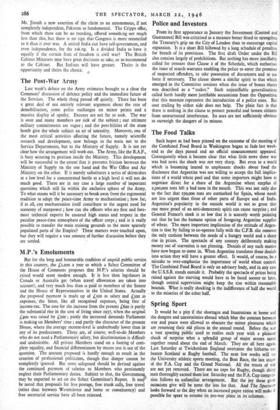The Post-War Army
Last week's debate on the Army estimates brought to a close the Commons' discussion of defence policy and the immediate future of the Services. The whole thing passed off quietly. There has been a great deal of not entirely relevant argument about the rate of demobilisation, some polite exchanges on minor points and a massive display of apathy. Excuses are not far to seek. The war is over and many members are sick of the subject ; our ultimate military commitments are vague ; and the possibilities of the atom bomb give the whole subject an air of unreality. Moreover, one of the most critical activities affecting the future, namely scientific research and development, now belongs in the main not to the Service Departments, but to the Ministry of Supply. It is not yet clear how the arrangement will work out. The Army, like the R.A.F., is busy securing its position inside the Ministry. This development will be successful to the extent that it prevents friction between the Ministry of Supply on the one hand and the War Office and Air Ministry on the other. If it merely substitutes a series of skirmishes at a low level for a concentrated battle at a high level it will not do much good. There are in any case a large number of important questions which still lie within the exclusive sphere of the Army.. To what extent will it be necessary to break away from the regimental tradition to adapt the peace-time Army to mechanisation ; how far, if at all, can mechanisation itself contribute to the urgent need for economy of manpower ; how can the officers who are first and fore- most technical experts be ensured high status and respect in the peculiar peace-time atmosphere of the officer corps ; and is it really possible to transfer the main training grounds to the more sparsely populated parts of the Empire? These matters were touched upon, but they will require a vast amount of further discussion before they are settled.






























 Previous page
Previous page